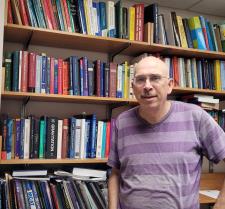
Walid.a A.
asked • 01/11/14What is Taylor Expansion for ( S)/((S^2+??^2 )(S^(2-?)+??^2 S^?))
i have tried adding and subtract ωº^2 for the second term
the final answer should be
((∑k,q(-1)k+q ωº 2 k ω2(k+q) (k+q)!) /(k! q!)) *(Sβ /( S 2+ωº 2)K+Q+1),Where β= -1-2 k+α+2α k+2 α q
More
1 Expert Answer
I figured out the general idea for this problem:
1. Find the inverse Laplace transform f(t) of the fraction F(s) you are given. This will involve using partial fraction decomposition and the shifting property. Depending on the value of α, you will get sines and cosines, multiplied by powers of t.
2. Find the Taylor series of f(t), which should be elementary.
3. Find the Laplace transform F(s) of this Taylor series, which will give you the answer you have.
Here's a simple example that doesn't require partial fractions and hence no double sum. Let's say
F(s) = 1/(s²+ω²).
Then
f(t) = sin(ωt) = ∑k (-1)k (ωt)2k+1/(2k+1)!
F(s)= ∑k (-1)k ω2k+1 /s2k+2.
For a more detailed answer, please check all your terms.
Still looking for help? Get the right answer, fast.
Ask a question for free
Get a free answer to a quick problem.
Most questions answered within 4 hours.
OR
Find an Online Tutor Now
Choose an expert and meet online. No packages or subscriptions, pay only for the time you need.






Steve S.
01/11/14